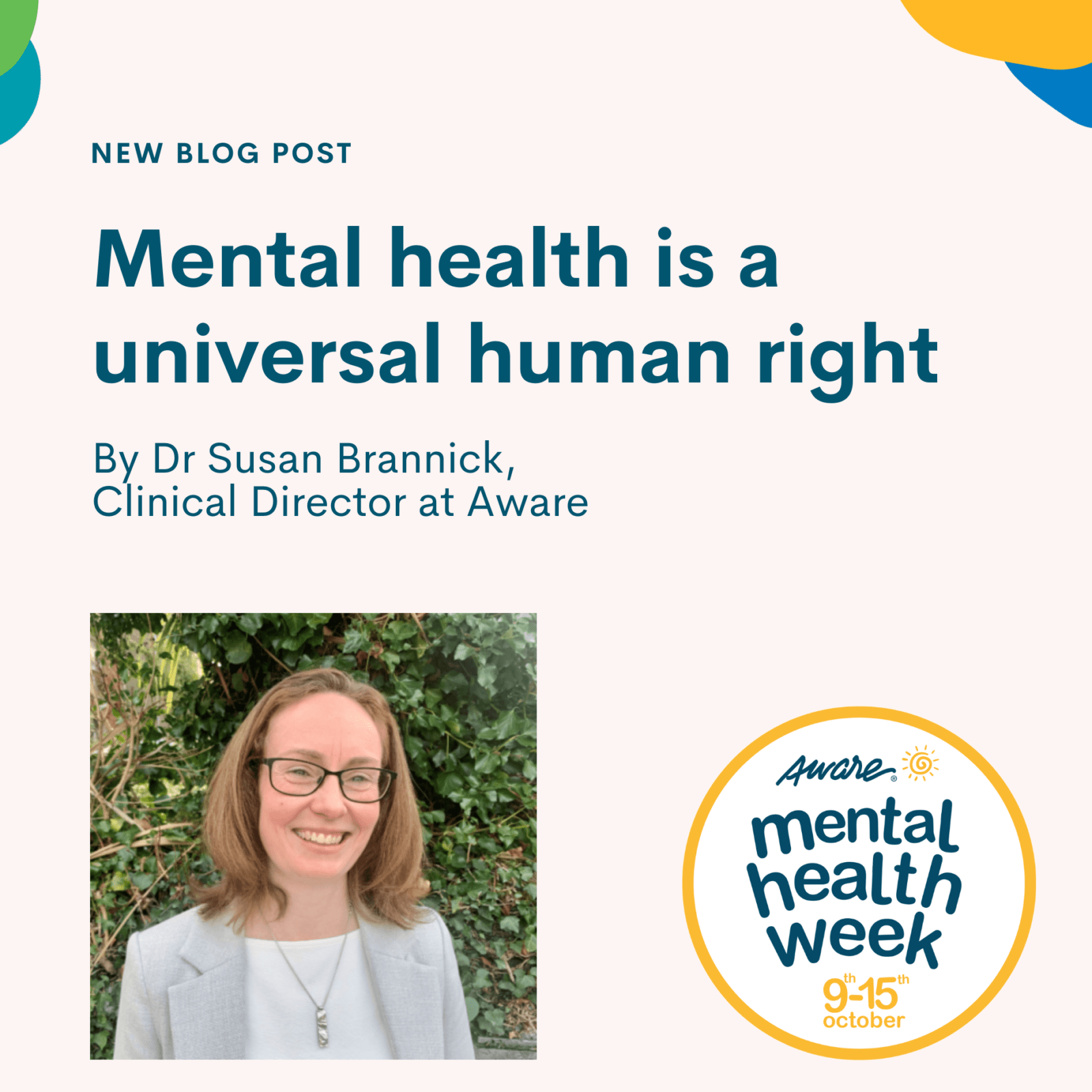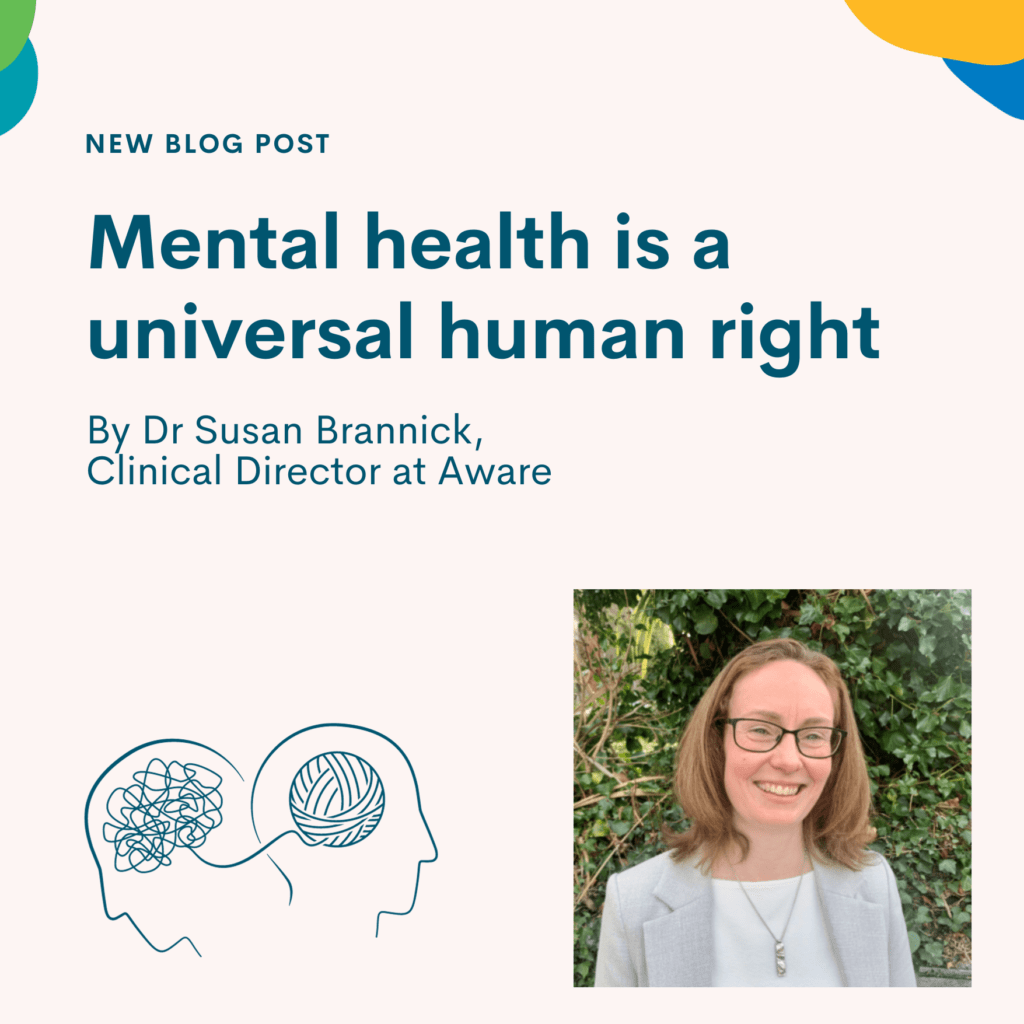
Today marks the annual WHO World Mental Health Day on 10th October. This year the theme is ‘Mental health is a universal human right’. To support this, we at Aware are running a weeklong mental health awareness campaign, highlighting mental health across the lifespan. More information can be found here.
The WHO outline several key messages to support in their theme of mental health as a basic human right. Their first message advocates that; ‘Good mental health is an integral part of our overall health and wellbeing’. They argue that good mental health is the basis from which we can respond to and manage the various challenges of life and ultimately thrive as human beings. This message is interesting as it alludes to the gradual moving away from Cartesian dualism of mind and body when we think about mental health. Cartesian dualism originated with the French philosopher Rene Descartes who is credited with proposing the idea that mind and body are separate things and can exist independently of each other.
Whilst it may seem strange to reference a philosopher from the 1500’s in this blog about World Mental Health Day in 2023, some argue that this artificial separation of mind and body is the core basis for how we have come to understand the concept of what we call ‘mental health’, and this dualism has underpinned the structure and organisation of mental and physical health services throughout history.
This separation of mind and body has generated a division between mental, and what are generally called health services, rather than ‘physical’ health services say. Healthcare versus mental healthcare. Nurse versus mental health nurse. ‘Normal’ everyday, versus other, different. This split can be seen in early asylums all the way to current day services where the mind of the person with COPD or heart disease is seen as an issue for the on call psych registrar, or where the physical health of people living with mental health conditions is overlooked to the point of this group dying 15 to 20 years earlier due to unrecognised or mismanaged physical health conditions. Where an appointment with a rheumatologist is likely to evoke less shame than attending the local mental health service.
Against this backdrop of stigma and othering, perhaps it is not surprising that the WHO have arrived now to the point of locating mental health in a human rights paradigm, i.e. the idea that every person can make certain claims or entitlements on the basis of their humanness, so in this case, entitlement to mental health. This is an inclusion of mental health to their originating position of the WHO right to health for all back in 1946.
According to the WHO, mental health as a human right involves fighting discrimination and stigma, knowing your rights, and everyone taking their place at the table, with equal opportunity of access and provision to, what the WHO call good quality community mental health supports.
Access to services is of particular interest this month, as the annual budget will be announced next week. The old adage of, ‘if you want to understand future behaviour, look to past behaviour’, feels relevant when it comes to the question of what the mental health budget will be for Budget 2024. Despite persistent calls and campaigning for funding over many years by many different organisations, the decision has been taken year in, year out, to underfund mental health services, with a fairly consistent allocation of about 5-6% of the health budget instead of the recommended 10-12%. The real-world impact of this funding choice is seen in lengthy CAMHS waiting lists, a shortage of multi disciplinary adult mental health services, and still in 2023, not one mother and baby unit on the whole island for women experiencing mental health problems after the birth to stay with their baby instead of being admitted to a general psychiatric ward.
So whilst stigma can operate at an individual level, for instance via exclusion of someone with a mental health condition from places or services, stigma can also be structural. It can be woven into the fabric of society, for instance via inadequate mental health services and supports, underfunding, or outright discrimination. Whilst the WHO encourage us to challenge stigma and discrimination around mental health, presumably as individuals, perhaps there is more thinking for us to do as a collective, as to how we may have our universal rights to mental health met in the world of 2023. And for policy writers and those holding the purse strings of public money to truly consider what it means when we say ‘mental health is a universal human right’.
This blog is by Dr Susan Brannick, Clinical Director at Aware as part of a monthly blog series.


